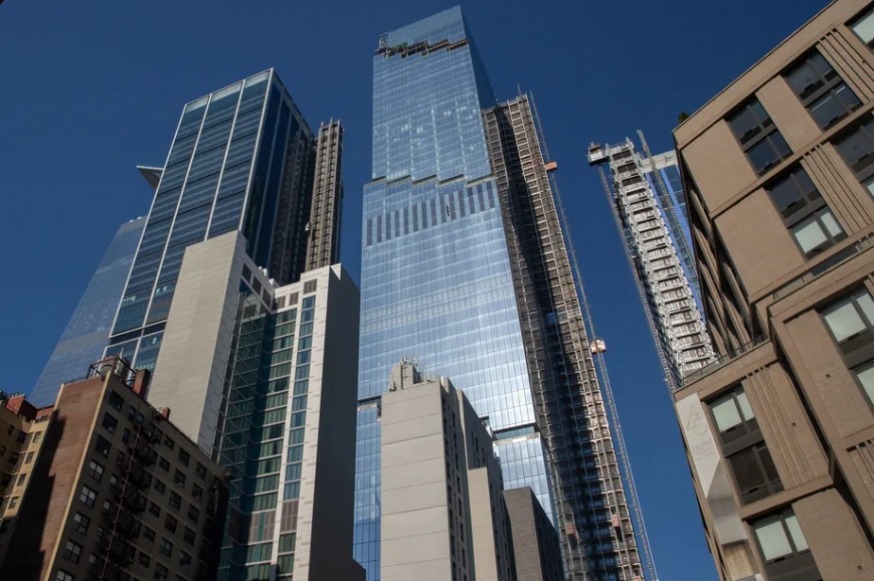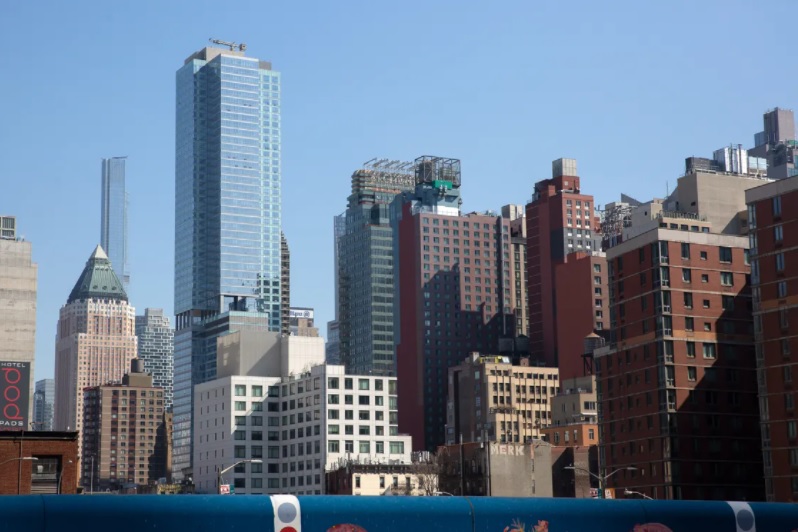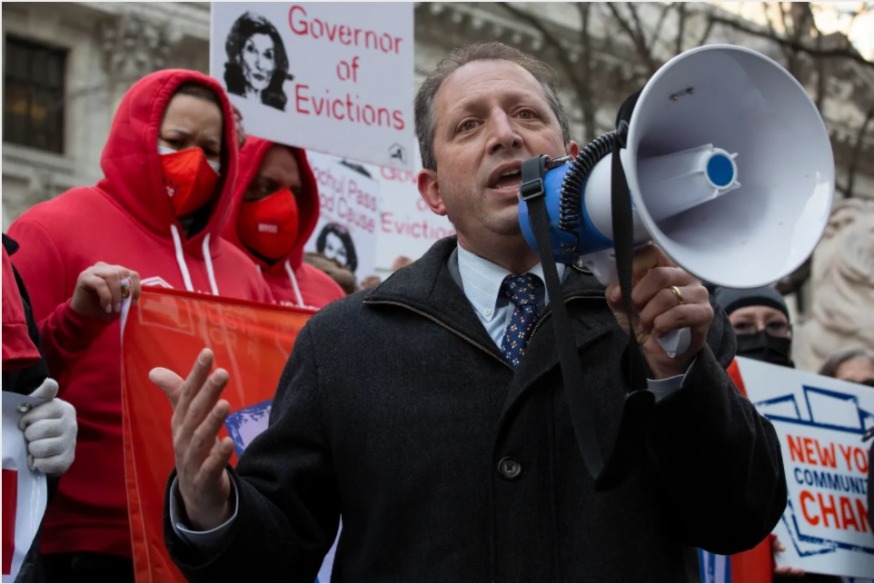
Construction at the Hudson Yards development in Manhattan, March 16, 2022. Ben Fractenberg/THE CITY.

This article was originally published by The CITY on March 16
To the Citizens Budget Commission, the controversial property tax break called 421-a for developers of new rental buildings, including affordable apartments, is essential to increase the city’s too-small housing supply.
“Allowing 421-a to lapse would significantly reduce rental housing development, worsen the city’s existing housing supply shortage and make New York City’s already scarce and costly rental housing scarcer and more expensive,” the CBC said in a report titled “Amend it, Don’t End It” issued Wednesday.
To City Comptroller Brad Lander, the program is a waste.
“421-a is expensive and inefficient,” he said Wednesday in his own report on the issue, issued one hour before the CBC released its assessment. “Most of the income-restricted units are unaffordable to the vast majority of New Yorkers, and especially to residents in the neighborhoods where they are built.”
Lander wants to see 421-a vanish in a trade-in for a broader property tax fix.
Gov. Kathy Hochul proposed to extend the program in her budget, with some tweaks and also a rebrand as Affordable Neighborhoods for New Yorkers. She’s making tougher affordable housing demands on developers, who must set aside at least 20 percent of their apartments for people at designated income levels.
Her plan would no longer count middle-income apartments as affordable housing and would require more units at lower income tiers.
Indeed, the fate of the tax break, which expires this summer and will reduce city property tax revenue by $1.77 billion in the year ending June 30, is likely to be decided by the end of the month, when the state is required to adopt a budget for the fiscal year that begins April 1.
That’s because many moderate Democrats in the Assembly and state Senate may have reservations about being on record voting for the developer tax abatement, exposing them to attacks from candidates running to their left in the June Democratic primary, both supporters and opponents say.
A budget agreed to by the governor and legislative leaders with some version of the tax break folded in doesn’t pose the same political problem come election time — and progressives are not likely to oppose the deal because of 421-a either.
In an important win for the proponents of the program, Mayor Eric Adams endorsed the Hochul proposal last month.
“We need to build more rental housing, and without this kind of tool, the housing crisis will only get worse. While the administration may suggest tweaks in the future, this proposal is incredibly important, and the Adams administration supports it,” a City Hall spokesman said Wednesday in a statement to THE CITY.
500K+ New Homes Needed
State lawmakers first enacted the 421-a tax exemption in 1971, with the city’s economy in its most severe post-war economic downturn, to spur developers to build apartments. It has continued in various iterations since, with occasional periods when the program lapsed amid disputes over its requirements.
The tax break now helps pay to build the vast majority of new housing. In the 10 years ending in 2020, 421-a accounted for 68 percent of all new apartments in buildings with at least four units, according to a report released last month by the NYU Furman Center. A related program accounted for an additional 21 percent — meaning nine out of every 10 new units benefited from some kind of tax break.

New construction goes up in Hell’s Kitchen, Manhattan, March 16, 2022. Ben Fractenberg/THE CITY
And half of all affordable units since 2014 have been built under 421-a and a locally administered tax break, according to data from the city.
Despite the tax break, the city is not building enough new residences.
New York needs 560,000 new units of housing by 2030 to make up the deficit in new construction over the past decade and accommodate expected population and job growth in the post-pandemic city, according to a study by the consulting firm AKRF commissioned by the Real Estate Board of New York.
The problem, says the new CBC report, is that New York has high costs to build and operate apartment buildings because of the cost of land, construction and property taxes. It estimates that without a tax break, rents on average would have to increase 75 percent to make development economically feasible.
“Most rental housing and especially housing that includes affordable housing simply would be too expensive to build,” said Andrew Rein, president of the CBC.
Lander disagrees, saying reducing property taxes on rental buildings would be sufficient to make new apartment construction affordable. The problem, he says, is that the city’s property tax system levies comparatively low taxes on single-family homes, condos and coops, then makes up the lost revenue with property taxes on rental buildings that can consume 30 percent or more of operating income.
Lander proposes letting 421-a lapse when it expires at the end of June, and urges state lawmakers to set an end-of-year deadline for comprehensive property tax reform.
He points to key recommendations from a property tax commission convened by former Mayor Bill de Blasio, including a single tax rate and valuation system for co-ops, condos, homes and small apartment buildings. Such a step would reduce taxes on rental buildings by 30 percent, his report contends.
He meanwhile urges a new affordable housing tax break to be targeted project by project, with the details worked out in negotiations with the city.

Ben Fractenberg/THE CITY Comptroller Brad Lander spoke outside the New York Public Library on Fifth Avenue, Jan. 14, 2022.
“We aren’t proposing nothing,” he told THE CITY in an interview. “We are proposing good property tax reform that solves a significant chunk of the problem.
Opponents of providing a new-development tax break include the Legal Aid Society and Sen. Michael Gianaris (D-Queens), the deputy Senate majority leader.
While Lander dismisses the Hochul changes as inconsequential, the CBC believes they go too far in requiring more affordable apartments be set aside for lower-income New Yorkers no matter where they are built.
Its study says that only developments in high-rent areas like Chelsea and downtown Brooklyn would be viable while the proposed new rules would deter new construction in places like Bushwick and Gowanus, where a new rezoning pushed by Lander is expected to produce thousands of new apartments.
Union Label
The key may be whether the state’s powerful labor unions decide to support or oppose an extension.
The building service workers union SEIU 32BJ — which secured a living wage guarantee in a previous 421-a extension — has come out strongly in favor of the Hochul plan.
“The worst thing we can do is to let the program expire without a replacement in place and see both good jobs and affordable housing production fall off a cliff — stripping our communities of much-needed affordability and leaving workers in the lurch,” said union president Kyle Bragg.
The New York City District Council of Carpenters denounced the Hochul plan earlier this week, calling for a more extensive overhaul. Still yet to weigh in are the rest of the building trades unions, whose support is crucial if the program is to be extended, insiders say.
Real estate interests say they remain confident they can get the program extended.
“We must seize this opportunity right now — regardless of long-term policy ideas, no matter how well-intended,” said James Whelan, president of the Real Estate Board of New York. “We are confident that the Governor’s proposal will be included in her final budget later this month.”
THE CITY is an independent, nonprofit news outlet dedicated to hard-hitting reporting that serves the people of New York.
